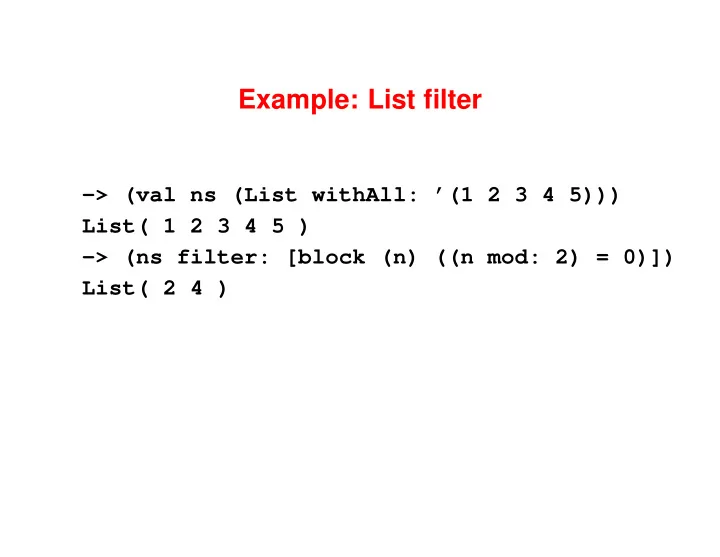

Example: List filter -> (val ns (List withAll: ’(1 2 3 4 5))) List( 1 2 3 4 5 ) -> (ns filter: [block (n) ((n mod: 2) = 0)]) List( 2 4 )
Classes codify different forms of data No interrogation about form! Design process still works 1. Each method defined on a class • The class knows the form! 2. Class determines • How object is formed ( class method ) • From what parts ( instance variables ) • How object responds to messages ( instance method ) Each form of data gets its own methods!
Using classes to implement filter Class determines how object responds: method defined on class Key classes in lists: • class Cons : an instance is a cons cell • class ListSentinel : an instance denotes end of list (method filter: (_) self) ;; on ListSentinel (method filter: (aBlock) ;; on Cons ([aBlock value: car] ifFalse:ifTrue: {(cdr filter: aBlock)} {(((Cons new) car: car) cdr: (cdr filter: aBlock))}))
Functional iteration: forms of data Iteration in Scheme: ask value about form (define app (f xs) (if (null? xs) ’do-nothing (begin (f (car xs)) (app f (cdr xs)))))
Object-oriented iteration: dynamic dispatch Instead of (app f xs), we have (xs do: f-block) ”For each element x in xs send (f-block value: x) ”
Example: iteration -> (val ms (ns filter: [block (n) ((n mod: 2) = 0)])) List( 2 4 ) -> (ms do: [block (m) (’element print) (space print) (’is print) (space print) (m println)]) element is 2 element is 4 nil ->
Implementing iteration What happens if we send “do f” to an empty list? What happens if we send “do f” to a cons cell?
Iteration by *dynamic dispatch* Sending do: to the empty list: (method do: (aBlock) nil) ; nil is a global object Sending do: to a cons cell: (method do: (aBlock) ; car and cdr are "instance variables" (aBlock value: car) (cdr do: aBlock)) Look! No if! Decisions made by dynamic dispatch
Example: method select: Like filter , but works with more “collections”: -> (val ns (List withAll: ’(1 2 3 4 5))) List( 1 2 3 4 5 ) -> (ns select: [block (n) (0 = (n mod: 2))]) List( 2 4 ) -> Also works with arrays and sets
select: dispatches to class Collection List , defined via *inheritance*, asks parent to do it Parent implements classic imperative code: (method select: (aBlock) [locals temp] (set temp ((self class) new)) (self do: [block (x) ((aBlock value: x) ifTrue: {(temp add: x)})]) temp)
“Collection hierarchy” Collection KeyedCollection Set Dictionary SequenceableCollection Array List
select: dispatches to code in many classes (method select: (aBlock) [locals temp] (set temp ((self class) new)) (self do: [block (x) ((aBlock value: x) ifTrue: {(temp add: x)})]) temp)
Message Protocol Dispatched to class Object Object Class List , others new List , Cons (delegated) do: Collection True or False ifTrue: Boolean value Block Block List (then addLast: , insertAfter: ) add: Collection
The six questions 1. Values are objects (even true , 3, "hello" ) Even classes are objects! There are no functions—only methods on objects
The six questions 2. Syntax: • Mutable variables • Message send • Sequential composition of mutations and message sends (side effects) • “Blocks” (really closures, objects and closures in one, used as continuations) • No if or while . These are implemented by passing continuations to Boolean objects. (Smalltalk programmers have been indoctrinated and don’t even notice)
Syntax comparison: Impcore Exp = LITERAL of value | VAR of name | SET of name * exp | IF of exp * exp * exp | WHILE of exp * exp | BEGIN of exp list | APPLY of name * exp list
Syntax comparison: Smalltalk Exp = LITERAL of rep | VAR of name | SET of name * exp | IF of exp * exp * exp | WHILE of exp * exp | BEGIN of exp list | APPLY of name * exp list | SEND of exp * name * exp list | BLOCK of name list * exp list
Syntax comparison: Smalltalk Exp = LITERAL of rep | VAR of name | SET of name * exp | IF of exp * exp * exp | WHILE of exp * exp | BEGIN of exp list | APPLY of name * exp list | SEND of exp * name * exp list | BLOCK of name list * exp list
The six questions 3. Environments • Name stands for a mutable cell containing an object: – Global variables – “Instance variables” (new idea, not yet defined)
The six questions 4. Types There is no compile-time type system. At run time, Smalltalk uses behavioral subtyping, known to Rubyists as “duck typing” 5. Dynamic semantics • Main rule is method dispatch (complicated) • The rest is familiar 6. The initial basis is enormous • Why? To demonstrate the benefits of reuse, you need something big enough to reuse.
Recommend
More recommend